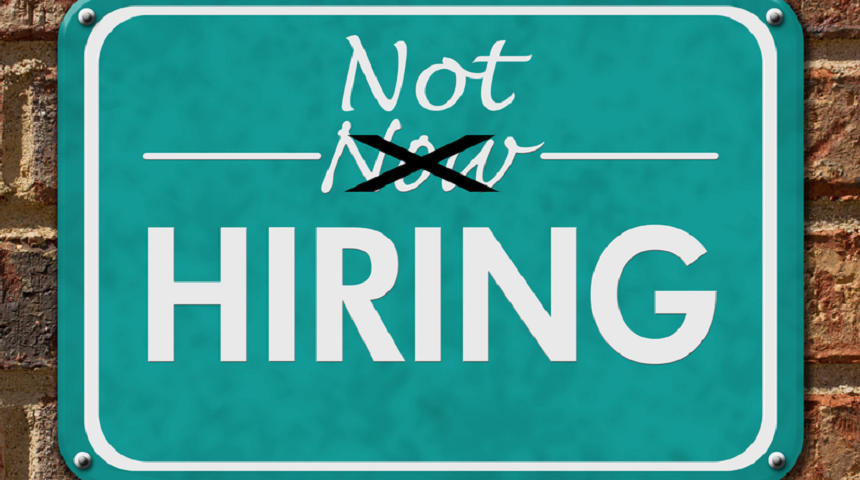Before you become concerned about your company's hiring freeze and what it implies for you, understand more about the causes and consequences. Understanding why organizations slow down the headcount growth allows you to comprehend how a hiring freeze can benefit you. We will go over what hiring freezes are, why they are used, how they affect current employees, and how to see them positively in this post, along with answers to frequently asked questions regarding this topic.
What is a hiring freeze?

A hiring freeze occurs when an employer temporarily prohibits the hiring of non-core employees in an attempt to reduce expenses through expense guidance. This typically occurs when a company is experiencing financial difficulties or taking a conservative approach to expenses. Management may also implement a hiring freeze in times of a recession or other economic or market duress that may result in the company realising production overcapacity, where a company produces more than the demand for a product or service. This over-production might have been caused by initial aggressive growth targets when forecasting their revenue growth for the year based on their strategies.
Hiring freezes may be short-term or long-term, however, usually, the main aim is to escape dismissing current employees. Hiring freezes can be achieved by not replacing vacant positions with employees that would have left the company, whilst ensuring that no new positions are created. Hiring freezes can occur in both failing and successful businesses that are facing unanticipated financial issues. A sudden economic downturn, catastrophic occurrence, product failure, unanticipated cost, or cost surge may prompt management to believe that decreasing costs is the best short-term answer.
Hiring freezes allow businesses to decrease or remove non-essential employment, effectively halting the development of payroll costs. Hiring freezes may allow management to restructure workgroups and combine the essential employee, resulting in increased efficiency in the production of imported goods and services for customers. Even with a hiring freeze, a corporation must do all possible to maximize income.
Reducing the size of the workforce through attrition does not necessarily imply that all hiring has ceased. Companies may still fill positions that are critical to meeting consumer needs or for specialized job functions that are critical to the operation of a company. These positions are simpler to fill with freelance, part-time, hourly (non-salary), casual employees or contract workers, allowing management to avoid full-time hiring freeze restrictions. Organizations must retain key activities such as product development, production, and sales even when hiring freezes are in place.
Why do Companies Implement Hiring Freezes?
Advertisment

Every firm is managed to ensure its long-term viability even under limited circumstances. This is usually aligned with the company's priorities. When a company faces major cash flow challenges as a result of bad market conditions or a significant drop in revenue, the primary goal is to preserve funds to keep operations afloat. A hiring freeze is likely to be implemented by a company's management in certain circumstances. The head of any executive department may exempt from the hiring freeze any positions that it deems necessary to meet the company's responsibilities, but all non-essential roles will remain vacated until the hiring freeze has ended. The following are some examples of situations where a corporation would contemplate a hiring freeze:
Salary budget exceeding quarterly budget
If the hiring of personnel would entail going over budget for employee compensation in the current quarter, a corporation can institute a hiring freeze. As a result, it's possible that employing new personnel will be put off until the new quarter begins or the challenges on their balance sheet are resolved.
Liquid assets are dwindling
If an employer is concerned that there are insufficient liquid assets to cover the cost of current assets when they are needed, a hiring freeze may be implemented. This is so that, as a last option, a portion of the wage budget that would go to new employees could be allocated to current assets. This is critical when the earnings period expenses are too high.
After layoffs, waiting to hire new personnel
Another rationale for hiring freezes is to keep staff morale high. When a corporation has to lay off a large number of employees, it may take some time before employing new staff to fill the vacancies. This is regarded as a courteous gesture toward current employees whose friends have been laid off.
Market conditions change
Market changes can have a significant impact on revenue generation and overall profitability. A decline in the ceiling board industry is an example of this. To combat the effects of changing market conditions, all enterprises directly involved in the manufacturing, distribution, or value-added services in the ceiling board industry may institute hiring freezes.
The worldwide crisis
Businesses all throughout the world have been negatively impacted by these crises, as demonstrated with the breakout of the COVID-19 pandemic. Businesses may postpone hiring new personnel during these periods while continuing to watch global markets and trends. Employers become more cautious and cautious during this time to ensure that they can at least keep their current employees.
How does a hiring freeze affect current employees?
For current employees, a hiring freeze can entail a variety of things. They may be affected by a hiring freeze since replacements for departing employees may not be available (e.g., retirement, birthing leave, or regular turnover). In the absence of new employees who would have been accountable for those responsibilities, a hiring freeze can compel a department and its staff to take on additional tasks. If the situation becomes too extreme, overall performance and employee work satisfaction may decrease. Employees may leave the company if they believe their task is excessive and they are not being appropriately compensated.
Managers may be compelled to keep low-performing personnel rather than deal with their underperformance through corrective action or termination if there is a hiring freeze. Furthermore, hiring temporary, freelancing, or other casual workers may negate some of the cost savings achieved by a hiring freeze, as well as creating a lack of continuity or loss of transferable job skills or intelligence when reviewing resumes. Additionally, current employees are likely to feel uneasy and confused as a result of a hiring freeze, yet hiring freezes can have more positive outcomes than one might imagine.
Advantages of Hiring Freezes
1. Restore Financial Stability
A hiring freeze would identify and do with unnecessary activities. Cutting such costs could mean that financial stability will be restored.
2. Improve Efficiency
With hiring freezes, management may be able to restructure workgroups and consolidate employees to create greater efficiency in producing the essential goods and services for its customers.
3. Improve teamwork
As the team is restricted from getting bigger, the management would need to work on the existing team by focusing on training and incentive programs. This could create loyalty, and motivation and empowers them directly impacting productivity. With the opening up of various communication channels, employees help to solve problems that may arise.
4. Re-evaluate business
It is a chance for the business to re-look at its operations and strategies for growth. Re-evaluating helps the company to rewrite its business plans to suit the market trends. This helps the business to review and update its policies, procedure of operation and bring changes. By doing so, it allows the company to position itself better in the competitive world of business for the future.
5. Bringing to a manageable size
Downsizing is actually to reduce the operations and size of the department so that it is manageable. It helps the business to serve customers efficiently as the situation is manageable. When the situation is manageable the profit is good.
6. Security to existing employees
While a hiring freeze usually indicates financial problems within a company, it’s not always a bad thing for employees. It could instead indicate to employees that the company will not be bringing in any new hires, however, their jobs are safe.
Disadvantages of Hiring Freezes
1. Losing employees
As the aim is mainly to minimize manpower, some of the roles may be combined to reduce inefficiency. If there is an integration of roles and functions, some of the workers may end up being let go.
2. Bad Publicity
Some companies especially creditors, may become reluctant in doing business with a company undertaking a hiring freeze as it is usually associated with financial hardship. Even if the hiring freeze has not been brought about by financial issues, the company brand and overall reputation will likely be adversely affected.
3. Affects profitability
While the objective is usually to reduce costs, a hiring freeze may not affect the company's profitability in the intended way. Productivity is unlikely to increase by much and in an environment where the company's business activity is worsening, it is common to see a company's profitability take a hit.
4. Fewer opportunities for development
A hiring freeze may signal to employees that there is no chance of promotion. This is because if an employee gets promoted, the company may not be able to replace them as they cannot hire new employees. For ambitious employees who would like to progress in their careers, this may be a deal-breaker and may seek a way out of the company.
5. Responsibilities Burdening
Employees at the company will be burdened with extra obligations and expectations that were supposed to have been covered by the new hires. This unideal situation may result in employees becoming stressed and/or disengaged due the additional job responsibilities from the vacant positions.
Workarounds During a Hiring Freeze

Even during a hiring freeze, smart employers continue to strategically hire in areas where skills and talent are essential to ensure the successful run of the business, and in areas that generate revenue. Often, these essential employees are consultants or freelancers who work hourly, daily, or weekly and are not paid benefits and have short-term contracts.
But, employers do hire essential employees during a hiring freeze. For example, if you are a software development firm, you will replace a project leader who is developing the next iteration of your key product. That individual's staff, because of the learning curve to bring a new developer up to speed might also be deemed essential. In certain situations, investing in the training of a short term contractor won't work for the long term.
Hiring freezes by top companies
Uber

In May 2020, Uber instituted a hiring freeze as a cost-containment measure due to the Covid-19 pandemic that has ravaged economies. Uber was very active when it came to communicating with their employees. An email sent to the employees by Uber Chief People Officer Nikki Krishnamurthy said, in part:
The COVID-19 crisis continues to evolve rapidly, so ELT has spent a lot of time over the last few days developing plans for this difficult period, for Uber and the world. Part of that means anticipating potential impacts on our business, and taking difficult but decisive steps now to get ahead of them. After several discussions, we have decided to pause net new hiring company-wide through May 31st, when we will re-evaluate and either stay the course or restart recruiting.
According to Julie Bort from the Business Insider, employees were expectedly nervous for weeks that the company was gearing up for another big restructuring, including layoffs. During an all-hands meeting, an employee asked Krishnamurthy about layoffs, but she assured them that the company had no plans for layoffs at the time. Allowing employees to ask questions and answer them goes a long way in calming nerves. The transparency brings in more co-operation within the group and within the team.

In April 2020, Google cut its marketing budget by as much as half for the remainder of 2020 and implemented hiring freezes, according to CNBC. The company has told marketing employees that it is slashing budgets and introduced a hiring freeze for both full-time and contract employees. \"There are budget cuts and hiring freezes happening across marketing and across Google,\" read one message sent from a global director to employees, according to CNBC. We, along with the rest of marketing, have been asked to cut our budget by about half for H2.
In response to the news of the hiring freeze, Google shares dropped nearly 2%, thereby affirming the effects of public perception in light of hiring freeze plans. The 2% drop in share price shows that investor opinion changed and Google shares began to be associated with greater uncertainty.
A Google spokesperson added that the company was slowing its hiring, but said a freeze wasn't happening across the entire company. This shows that hiring freezes can target a specific department or area.
